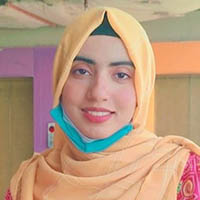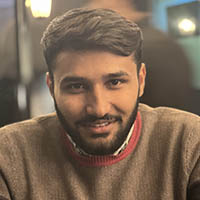By Hamna Aziz and Adnan Haider Cheema
The world is full of complications, but humans have learned to adapt new techniques and apply their expertise to tackle complex issues. Many professions have developed based on unique types of knowledge and problem-solving techniques. Gradually, certain skills become desirable for particular types of problems; as such, individuals often choose their career paths based on their own specific skillsets.
Most scientific fields require at least some level of mathematical conception. Students with strong mathematical backgrounds are therefore well equipped for a wide variety of opportunities in various fields. “Employers are looking for math majors a lot more than they used to,” Mike Breen of the American Mathematical Society said in 2012 [1]. Many different areas of science—including computer science, engineering, economics, and biology—rely on mathematics in some way. For instance, mathematical biologists study diseases with modeling methods and mathematical formulations. Other researchers apply mathematics in systematic and abstract ways to approach real-world issues.
The COMSATS University Islamabad (CUI) SIAM Student Chapter recently organized an event called “Careers in Mathematics,” which took place on October 14, 2022. Speakers with varied mathematical backgrounds addressed mathematics majors and shared personal insights about building successful careers, which is a common point of concern among students.
Participants of the COMSATS University Islamabad (CUI) SIAM Student Chapter’s “Careers in Mathematics” event pose with the hosts and speakers. Photo courtesy of the CUI SIAM Student Chapter.
The event began with a recitation of the Holy Quran, followed by the national anthem of Pakistan. Shamsul Islam (head of CUI’s Department of Mathematics) delivered welcoming remarks that shed light on the importance of mathematics at the industry level. He attested to the increasing demand for mathematicians in workforce, reminded students that mathematics forms the basis of nearly every scientific field, and encouraged them to regularly participate in networking events.
Next, Ahmad Raza Shahid—a professor at the Foundation for Advancement of Science and Technology National University of Computer and Emerging Sciences (FAST NUCES) with 14 years of experience in higher education—took the stage. He offered insight into the evolution of Industry 4.0 (also known as the Fourth Industrial Revolution), which encompasses blockchain, virtual reality, 5G networks, digital twins, and other modern technologies. Shahid also discussed ways in which mathematicians can establish careers in exciting fields like quantum computing, natural language processing, and data modeling.
The hosts then introduced the event’s second speaker: Iftikhar Ahmed, an assistant professor in the Department of Mathematics at CUI Abbottabad with a Ph.D. in computational science and engineering from the University of Illinois Urbana-Champaign. He explained the great demand for mathematicians in computational and biological domains by presenting several core problems that only mathematicians can solve. Ahmed noted that mathematicians possess particular skills that experts in other fields may lack. His presentation focused on one very interesting question: Why would a company hire a mathematician? To answer this query, he revealed numerous opportunities and gateways of which students were not previously aware and discussed current research in graph theory, combinatorics, and supply-demand systems. Ahmed also emphasized the importance of building professional networks and mastering concepts and skills like coding. He concluded his speech by encouraging students to focus on industry’s primary desire: the ability to provide solutions that can earn revenue.
Hammad Majeed, an associate professor at FAST NUCES, gave the third and final talk. He reiterated the significance of mathematics with a Google search for jobs that are open to mathematicians, which yielded many results. His address utilized facts and figures to confirm that every position requires practical experience with specific skills. Majeed indicated that industry employers do not necessarily care whether one’s degree is in mathematics, computer science, or another field, so long as the employee is able to solve problems.
Officers of the COMSATS University Islamabad (CUI) SIAM Student Chapter pose with speakers and faculty during the “Careers in Mathematics” event. Photo courtesy of the CUI SIAM Student Chapter.
The next stage of the event involved a panel discussion during which expert speakers responded to student queries with real-life examples. When asked about the feasibility of switching focus areas after earning a bachelor’s degree, Majeed reassured listeners that their solid foundation in mathematics will allow them to familiarize themselves with other fields, such as information technology, computer science, artificial intelligence, and so forth. For instance, an existing mathematical understanding allows mathematicians to work in data science without any formal experience. The panelists facilitated the discussion by sharing facts and personal experiences that maintained the session’s momentum.
Islam, Abdullah Shah, and Suhail Iqbal concluded the event by distributing shields among the speakers in recognition of their contributions. Ultimately, the event was especially beneficial for students who are preparing to graduate; their enthusiasm has inspired us to plan many more similar events in the future.
Acknowledgments: The authors would like to thank Fatima Sehar, president of the CUI SIAM Student Chapter, for proofreading this article.
References
[1] Torpey, E. (2012, Fall). Math at work: Using numbers on the job. Occupation. Outlook Quarter., 56(3).
 |
Hamna Aziz is a student in the Department of Mathematics at COMSATS University Islamabad (CUI) in Pakistan. She is the content team head of the CUI SIAM Student Chapter. |
 |
Adnan Haider Cheema is pursuing his bachelor’s degree in physics at CUI. He is an active volunteer with the CUI SIAM Student Chapter. |